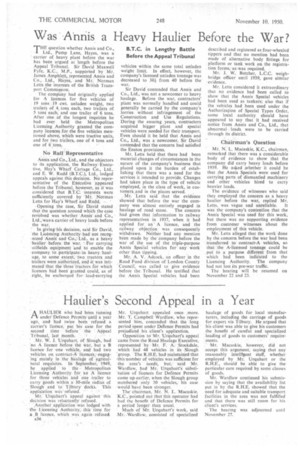Was Atiriis a Heavy Haulier Before the War?
Page 54

If you've noticed an error in this article please click here to report it so we can fix it.
B.T.C. in Lengthy Battle Before the Appeal Tribunal
THE question whether Annis and Co.,
Ltd., Pump Lane, Hayes. was a carrier of heavy plant before the war has been argued at length before the Appeal Tribunal. Sir David Maxwell Fyfe, K.C., M.P., supported by Mr. James Amphlatt, represented Annis and Co., Ltd., Hayes, and Mr: Norman Letts .the interests of the British Transport Commission.
The company had originally applied for A licences for five vehicles of 19 tons 19 cwt. unladen weight, two trailers of 4 tons each, two trailers of 5 tons each, and one trailer of 6 tons. After one of the longest inquiries he had ever held the Metropolitan Licensing Authority granted the company licences for the five vehicles mentioned above, which were tractive units, and for two trailers, one of 4 tons and one of 6 tons.
No Rail Representative Annis and Co., Ltd., and the objectors to its application, the Railway -Executive. Hay's Wharf Cartage Co., Ltd., and E. W. Rudd (B.T.C.), Ltd., lodged appeals against this decision. No representative of the Ertecutive appeared before the Tribunal, hoWeVer, as it was considered that B.T.C. -interests were sufficiently covered by -Mi. ',Norman
Letts for Hay's Wharf and Rudd. '
Opening the case, Sir David stated that the question around which the case revolved was whether Annisand Co., Ltd„-wa9a-carrier of heavy loads before the war.
' In giving his decision, said Sir David, the Licensing Authority had not recag • nized Annis and Co.; Ltd., as a heavy haulier' before the war. For carrying oilfields equipment and to enable the company to. participate:. in heavy, haulage, to some extent, two tractors and trailers were authorized, and it was intimated that the three tractors for which licences had been granted could, as of right, be exchanaed forload-carrying vehicles within the same total unladen weight limit. In effect, however, the company's licensed unladen tonnage was decreased to 30i from 40 before the war.
Sir David contended that Annis and Co., Ltd., was not a newcomer to heavy haulage. Before the war, contractors' plant was normally handled and could generally be carried by the company's lorries without infringement of the Construction and Use Regulations. During the ensuing years, contractors acquired bigger plant and special vehicles were needed for their transport. Even should it be held that Annis and Co., Ltd., was a newcomer, Sir David contended that the concern had satisfied the Enston provisions.
Mr. Letts held that there had been material changes of circumstances in the nature of the company's business that placed upon it the burden of establishing that there was a need for the services it intended to provide. Changes had taken place in the type of vehicle employed, in the class of work, in customers and in the places served.
Mr. Letts said that the evidence showed that before the war the company was almost entirely engaged in haulage of road stone. The concern had given that information to railway representatives in 1937, when it had applied for an A licence, and the railway objection was consequently withdrawn. Neither had any mention been made by the company before the war of the use of the triple-purpose Annis Special vehicles for any work other than tipping.
Mr. A. V. Adcock, an officer in the Road Fund division of London County Council, was called to give evidence before the Tribunal. He testified that the Annis Special vehicles had been described and registered as four-wheeled tippers and that no mention had been made of alternative body fittings for platform or tank work on the registration forms, as was required.
Mr. J. W. Butcher, L.C.C. weighbridge officer until 1939, gave similar evidence.
Mr. Letts considered it extraordinary that no evidence had been called to show that the Annis Special vehicles had been used as tankers; also that if the vehicles had been used under the Authorization of Special Types Order, some local authority should have appeared to say that it had received notice from Annis and Co„ Ltd., that abnormal loads were to be carried through its district.
Chairman's Question
Mr. N. L. Macaskie, K.C., chairman, remarked that there was a considerable body of evidence to show that the company did carry heavy loads before 1939. He asked whether it could be that the Annis Specials were used for carrying parts of dismantled machinery and other vehicles hired to carry heavier loads.
The evidence of witnesses who said they employed the concern as a heavy haulier before the war, replied Mr.
Letts. was vague and unreliable. It was the company's contention that the Annis Special was used for this work, hut there was no supporting evidence from customer witnesses about the employment of this vehicle.
Mr. Letts alleged that the work done by the concern before the war had been transferred to contract-A vehicles, so that the A-licensed tonnage could be put to a purpose different from that which had been indicated to the Licensing Authority. The company had not lost its pre-war traffic.
The hearing will be resumed on November 22 and 23,




















































































